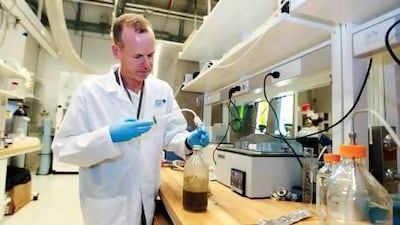ABU DHABI // A new way to convert waste into energy is being pioneered by a group of researchers at the Masdar Institute.
Dr Jens Ejbye Schmidt, a biofuels expert, and his team are using traditional methods of oil refining but applying them to biomasses.
Instead of taking crude oil and making it into oil, waste is refined to take out substances such as phosphorus, which is found in toilet waste, or potassium, which can be used for fertiliser, and the resulting products can be used as fuel.
“At some point, fossil fuel will be limited or be expensive,” Dr Schmidt said. “We want to make the same thing using biomasses such as household waste, camel dung and industrial plant waste.”
The UAE produces more household waste than many other countries. Reducing it is key to cutting the country's carbon footprint.
But, warns Dr Schmidt, energy from waste may not come cheap. "Society would have to pay," he said, because biogas is more expensive than the UAE's cheap petrol.
The team is growing UAE-native algae with a goal of extracting lipids, protein and carbohydrates, all of which can be made into fuel by bacteria that convert the algae into biofuels and fertiliser.
“We’re working with algae and waste because that’s what there is the most of here,” he said.
Eventually, the plan is to build industrial-sized bioreactor tanks near the coast, where the algae are grown and harvested.
And biofuel is not the only useful product. “Algae also contain things that can be used for pharmaceuticals or cosmetics, and they have anti-cancer components too.
“Once you take those components out, you can use the remainder to make biofuels – biogas, bioethanol and biodiesel.”
Biogas and biodiesel can be used in cars as replacements for normal diesel and natural gas, while bioethanol be added to normal petrol. Cars can use petrol that includes up to 10 per cent bioethanol without modification – and can easily be modified to use petrol with even more.
“If it’s used in a higher percentage or pure you just need to adjust the car,” Dr Schmidt added. “However there are ‘flex’ cars on the market that can run on both gasoline and pure bioethanol.”
He expects it eventually to provide a useful source of income for the UAE.
“If we can produce drugs and cosmetics from algae, it could be a really nice thing in addition to the fuel and fertiliser, and it would make it more sustainable at the same time,” he said.
The algae are used to convert organic matter in camel dung into methane, a biogas.
“The biogas goes up in pipes, for example to a power plant or a central cooling plant, and the leftover liquid part is fertiliser, which gets recycled back to agriculture,” Dr Schmidt said.
The process is already well-established in Europe using cow manure, but this will be the first time it has been tried with camel dung, which is far drier.
The key, Dr Schmidt said, would be persuading farmers to install the system and use the fertiliser it produces.
“They are fairly conservative and prefer to do what they’ve always done.”
Once the system is installed the fertiliser is free – but because it is a liquid rather than the usual powder, farmers would need to buy new equipment to spread it.
But it is worth making that effort, he said.
“If we do not recycle the nutrients, the UAE has to use artificial fertiliser, which is becoming more and more expensive and has a high carbon footprint.
“Plants are the only thing that at present can produce carbon. We need biomass that has carbon to produce many of the compounds we are using in society today.
“We use fossil fuel to produce them today, but in the future, when there is no more fossil fuel, we need to produce from other biomass.
“We need to start to learn techniques now so we can do it in an economically and environmentally sustainable way.
“It would take about three tanks of 1,000 cubic metres to produce biogas in a power plant, but it would need about 400 tonnes of organic waste per day.
“This is just a fraction of the UAE’s household waste and would require a method of separating waste, as happens in countries such as the UK, to ensure only organic matter goes to the biogas reactor.
“We need 200 to 400 tonnes per day to feed into the biogas reactor, to produce power, cooling and heating, fuel and fertiliser at the same time.”
The success of the project will also rely on marketing. “Not all countries will pay for gas. We have to persuade the government that they must put a price on bio-gas. We need to teach people over the coming years.
“This isn’t expensive to implement. The cost of building a plant is low versus other fuels such as ethanol and the engineering required isn’t anything fancy.”
mswan@thenational.ae

